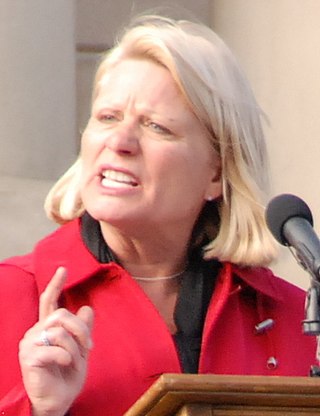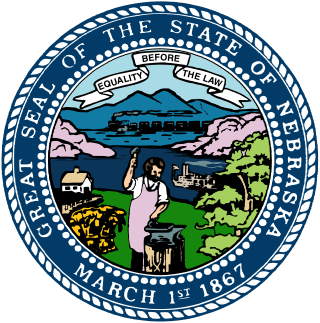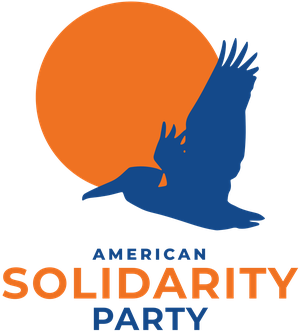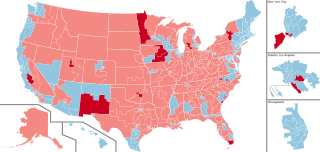
The Green Party of California (GPCA) is a California political party. The party is led by a coordinating committee, and decisions are ultimately made by general assemblies. The GPCA is affiliated with the Green Party of the United States (GPUS).

The Libertarian Party of Connecticut is a statewide affiliate of the U.S. Libertarian Party. According to the bylaws posted on its web site, the Connecticut Libertarian Party has the basic aims of furthering individual freedom and opposing the initiation of force against individuals, among other things. It does this by engaging in political, educational, and social activities.

Ruth Johnson is an American businesswoman and politician currently serving as a member of the Michigan Senate since 2019. She was the 42nd Secretary of State of Michigan from 2011 to 2019 and a member of the Michigan House of Representatives from 1999 to 2005. She is a Republican.

Douglas Lee LaMalfa is an American politician serving as the U.S. representative for California's 1st congressional district since 2013. A member of the Republican Party, his district, formerly the second-largest in the state after the 8th, covers nearly all of interior Northern California, including Chico, Redding, and Susanville.
The Independent Party of Oregon (IPO) is a centrist political party in the U.S. state of Oregon with more than 140,000 registrants since its inception in January 2007. The IPO is Oregon's third-largest political party and the first political party other than the Democratic Party and Republican Party to be recognized by the state of Oregon as a major political party.

From January 3 to June 5, 2012, voters of the Democratic Party chose its nominee for president in the 2012 United States presidential election. President Barack Obama won the Democratic Party nomination by securing more than the required 2,383 delegates on April 3, 2012, after a series of primary elections and caucuses. He was formally nominated by the 2012 Democratic National Convention on September 5, 2012, in Charlotte, North Carolina.

Bradley Jay Little is an American politician serving as the 33rd governor of Idaho since January 2019. A member of the Republican Party, he served as the 42nd lieutenant governor of Idaho from 2009 to 2019 and as an Idaho state senator from 2001 to 2009.

This article contains the results of the 2012 Republican presidential primaries and caucuses, which resulted in the nomination of Mitt Romney as the Republican nominee for President of the United States. The 2012 Republican primaries were the selection processes by which the Republican Party selected delegates to attend the 2012 Republican National Convention from August 27–30. The series of primaries, caucuses, and state conventions culminated in the national convention, where the delegates cast their votes to formally select a candidate. A simple majority (1,144) of the total delegate votes (2,286) was required to become the party's nominee.

The 2012 United States presidential election in Nebraska took place on November 6, 2012, as part of the 2012 United States presidential election in which all 50 states plus the District of Columbia participated. Voters chose five electors to represent them in the Electoral College via a popular vote pitting incumbent Democratic President Barack Obama and his running mate, Vice President Joe Biden, against Republican challenger and former Massachusetts Governor Mitt Romney and his running mate, Congressman Paul Ryan.
This article contains lists of official and potential third-party and independent candidates associated with the 2016 United States presidential election.
The following is a timeline of major events leading up to, during, and after the 2016 United States presidential election. The election was the 58th quadrennial United States presidential election, held on November 8, 2016. The presidential primaries and caucuses were held between February 1 and June 14, 2016, staggered among the 50 states, Washington, D.C., and U.S. territories. The U.S. Congress certified the electoral result on January 6, 2017, and the new president and vice president were inaugurated on January 20, 2017.
Jason A. Monks is an American politician serving as a member of the Idaho House of Representatives from District 22.

The American Solidarity Party (ASP) is a Christian democratic political party in the United States. It was founded in 2011 and officially incorporated in 2016. The party has a Solidarity National Committee (SNC) and has numerous active state and local chapters. Peter Sonski is the party's nominee in the 2024 United States presidential election.

United States gubernatorial elections were held on November 6, 2018, in 36 states and three territories. These elections formed part of the 2018 United States elections. Other coinciding elections were the 2018 United States Senate elections and the 2018 United States House of Representatives elections.

The 2016 United States presidential election in Tennessee was held on November 8, 2016, as part of the 2016 General Election in which all 50 states plus the District of Columbia participated. Tennessee voters chose electors to represent them in the Electoral College via a popular vote pitting the Republican Party's nominee, businessman Donald Trump, and running mate Indiana Governor Mike Pence against Democratic Party nominee, former Secretary of State Hillary Clinton and her running mate, Virginia Senator Tim Kaine.

The 2016 United States presidential election in Idaho was held on Tuesday, November 8, 2016, as part of the 2016 United States presidential election in which all 50 states plus the District of Columbia participated. Idaho voters chose electors to represent them in the Electoral College via a popular vote, pitting the Republican Party's nominee, businessman Donald Trump, and running mate Indiana Governor Mike Pence against Democratic Party nominee, former Secretary of State Hillary Clinton, and her running mate Virginia Senator Tim Kaine. Idaho has four electoral votes in the Electoral College.

The 2020 United States House of Representatives elections were held on November 3, 2020, to elect representatives from all 435 congressional districts across each of the 50 U.S. states to the 117th United States Congress, as well as six non-voting delegates from the District of Columbia and the inhabited U.S. territories. Special House elections were also held on various dates throughout 2020.

Below is a detailed tally of the results of the 2020 Republican Party presidential primary elections in the United States. In most U.S. states outside New Hampshire, votes for write-in candidates remain untallied.

The 2004 Libertarian Party presidential primaries allowed voters to indicate non-binding preferences for the Libertarian Party's presidential candidate. These differed from the Republican or Democratic presidential primaries and caucuses in that they did not appoint delegates to represent a candidate at the party's convention to select the party's nominee for the United States presidential election. The party's nominee for the 2004 presidential election was chosen directly by registered delegates at the 2004 Libertarian National Convention, which ran from May 28 to 31, 2008. The delegates nominated Michael Badnarik for president and Richard Campagna for vice president.















